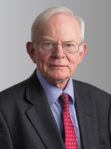
Francis Barlow KC – (1938 to 2023)
7th Nov 2023
Francis was called to the Bar in 1965 and took Silk in 2006. Originally practising from 8 Stone Buildings (where latterly he was joint Head of Chambers) he was one of the principal architects of the merger with Ten Old Square in 1996, and was Head of Chambers from 2013 until his retirement from the Bar in 2022.
Throughout his long and distinguished career he was a pre-eminent practitioner in the field of trusts; hugely respected by solicitors, barristers and the judiciary.
Francis was instrumental in making and shaping the law. Amongst his leading cases were:
• Chellaram v Chellaram, 1983, establishing the ability of the Court to assert jurisdiction in respect of a foreign trust where the trustees were subject to the English Court’s jurisdiction
• Re DWS, 2000, regarding the ability of a child to inherit the estate of their murdered parent; a case which went to the ECHR and ultimately led to the Estates of Deceased Persons (Forfeiture Rule and Law of Succession) Act 2011
• Sieff v Fox, 2005, a major decision on the jurisdiction to set aside trustee mistakes pursuant to the so-called rule in Hastings Bass (as it then was)
• Sherrington, 2006, a leading case on the evidence required to establish the invalidity of a will for failure to comply with the requirements for execution
• Thomas and Agnes Carvel Foundation v Carvel, 2008, concerning the jurisdiction of the court to remove a personal representative and trustee of foreign wills
• Breakspear v Ackland, 2009, the leading English case on the obligation of trustees to disclose confidential documents to their beneficiaries and the status of letters of wishes
• Re AQ Trust, 2010, in which Francis acted as amicus to the Bermuda Court in a complex case concerning the validity of a lifetime trust and its revocation by marriage
• Corbett v Newey, 2016, concerned with whether a will made conditional upon an event is valid, which went to the Court of Appeal and generated further case law regarding the recoverability of the costs of the probate claim
• PQ v RS, 2019, a case on the exercise of a power of appointment to create discretionary trusts where Re Morris’s Settlement Trusts and Re Hunter’s Will Trusts were conveniently sidelined
As the undisputed master of applications under the Variation of Trusts Act 1958, his cases extending perpetuity and accumulation periods of trusts were legion, those reported being:
• Wyndham v Egremont, 2009, the first reported case since the 1960s on the ability of the Court to approve an extension of the perpetuity and accumulation periods for trusts
• V v TA, 2014, and then MN v OP, 2019, in the Court of Appeal, on the Court’s jurisdiction to anonymise proceedings and judgments in VTAs
• A v B, 2016, in which the Court confirmed that it was possible to avoid joining or having the consent of innumerable adult beneficiaries to applications under the VTA
• C v C, 2016, in which it was decided that the English Court had jurisdiction to vary foreign trusts
• DC v AC, 2016, concerned with the jurisdiction to vary, the proper approach of the Court and the effect of a variation on an existing interest in possession
Given the field in which he worked, the vast majority of Francis’s cases never reached the public’s attention, but some of the greatest families in the land have benefited from his erudite and wise advice, and his incomparable and elegant drafting will have left an indelible mark on some of the country’s most historic landed estates.
Aside from his busy practice, Francis was an editor of Williams on Wills, and a contributor to Thomas and Hudson’s The Law of Trusts, OUP’s International Trusts Disputes, and many a legal journal (often to express outrage, in the nicest possible way, over a decision which he would conclusively demonstrate as wrong). His expertise was called upon by the UK Government, as one of the ‘Group of Experts’ considering the European proposals that led to the EU Succession Regulation, and although the UK Government did not adopt the Regulation many of the points made on behalf of the UK Government are reflected in its drafting.
As a colleague, he was simply the best. We are grateful for his innumerable acts of kindness and for his wise and sage advice, given generously and with interest. He was always unfailingly courteous, modest of his own achievements and generous in his praise. For a man of such distinction, he had no airs, but treated everyone as an equal and with great respect.
But perhaps above all, and for which he will be remembered by many throughout Lincoln’s Inn (where he was a Bencher) and beyond, Francis was the most congenial of men and the most enormous fun. His laugh – whether from the Clerks’ Room as he chatted with anyone present, or from his room whilst engaged in the most high-powered conference with the grandest of clients – could be heard throughout Chambers. As he would say to each year’s pupil starting out on their career, the important thing was for them to be happy at the Bar. Francis was undoubtedly happy, but what is more he spread and encouraged that happiness amongst us all.
He was a devoted husband, father and grandfather, and our thoughts are with Helen and with all of them.
It was a great privilege to have known Francis, to have learned from him, to have worked alongside him, and to call him a friend. We will all miss him.


